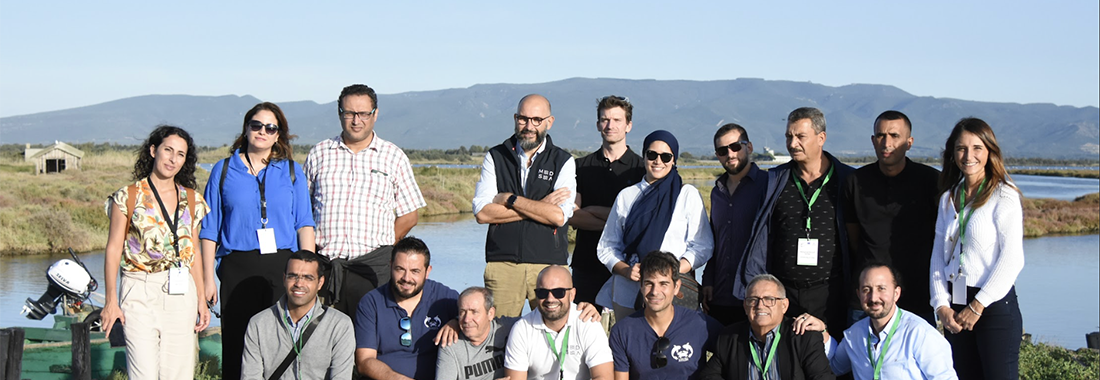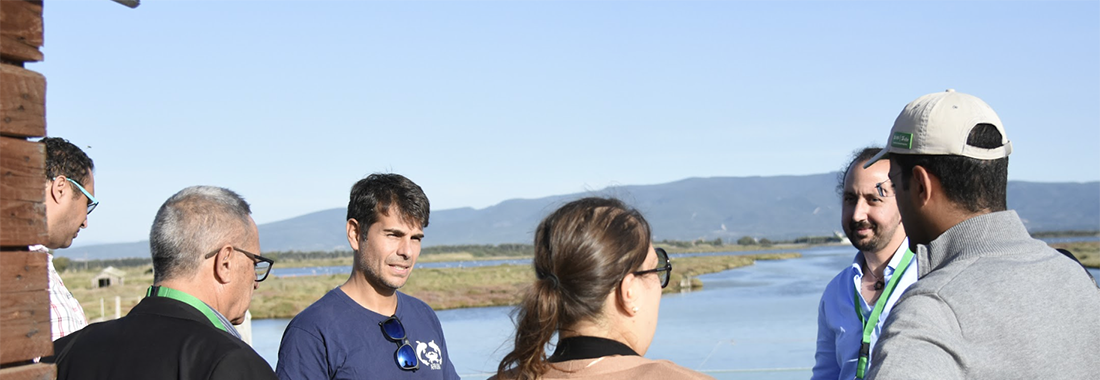Two days to study an integrated management model of marine-coastal systems, two days to strengthen ties and develop new strategies for a sustainable future of the Mediterranean. The Italian stage of the ENSERES project ended in Oristano, Sardinia. The exchange visit involved the Tunisian partners of Sfax and the Gulf of Gabes, a representation of the city of Tyre, Lebanon, and its Nature Reserve, the experts of ETC-UMA University of Malaga and MedCities.
The meeting, held at the Mistral II hotel, started off with Alessio Satta, president of the MEDSEA foundation, partner of ENSERES. Satta illustrated the steps taken by MEDSEA with Maristanis, the project that in six years has managed to create in the Gulf of Oristano a management of marine-coastal areas capable of involving ten municipalities that overlook the gulf and host six Ramsar sites, wetlands protected by the 1971 convention. Numerous interventions for environmental conservation and the promotion of a sustainable economy are now framed within the Coastal Contract, a juridical-political instrument that brings together all the subjects, public and private, involved in the governance of one of the most precious and fragile corners of the Mediterranean. According to the latest analyzes, due to climate change part of the Gulf of Oristano could be submerged by 2100.
The workshop saw the speech of Fabrizio Paloni, coordinator of the ENI CBC MED secretariat for the Autonomous Region of Sardinia, who talked about the difficulties of the pandemic years and at the same time outlined a future of great commitment and prospects. Important for the first day, marked by presentations as well as by the spontaneous interaction of those present, the explanations of Vania Statzu, vice-president MEDSEA, who analyzed the water saving activities of the Maristanis project, in particular in the agricultural context. To close the session, the speeches of Francesca Frau, a MEDSEA biologist, and Andrea Camedda, a researcher at the National Research Center, on the problems related to the protection of Posidonia Oceanica (Mediterranean tapeweed) and plastic pollution.
Statzu and Camedda were also protagonists of the evening program, focused on the field visits. The vice-president of MEDSEA accompanied the group of visitors through the vast company of the Ferrari, a family of rice producers who decided to embrace precision agriculture conducted with drones, a practice funded in its initial stages within the project Maristanis. A few hours later, the partners of ENSERES found Camedda on the beautiful beach of San Giovanni di Sinis, and together with him they had direct experience of plastic pollution and the measures necessary to address it.
"Today we experienced the true spirit of Mediterranean cooperation - says the president of MEDSEA Alessio Satta. During the workshop we presented the model of Oristano, discussed its possible application in Tire and in the Gulf of Gabes, the obstacles, solutions and perspectives. A 'horizontal' debate, during which each partner brought their special experience". A comment collected by Ali Badreddine, biologist of the Nature Reserve of Tyre: “The first day in Oristano showed how important the exchange of ideas can be. The Maristanis project has confirmed how important is the involvement of the population, at all levels, in the integrated management of beautiful and fragile places. This is what we are doing in Tyre thanks to the ENSERES project. I am thinking in particular about the young people, we need their energy”.
The second day of the workshop was opened by greetings from Christoph Schroder, geographer of the University of Malaga and coordinator of the ENSERES project. Giulia Eremita, head of MEDSEA communication and tourism expert, then spoke about “Friends of Maristanis”, the group of Oristano companies that has decided to follow MEDSEA in its sustainable approach. She was followed by Francesca Etzi, MEDSEA engineer who showed in detail the many restoration interventions carried out in the Gulf of Oristano. Very important were the presentations by Alessio Satta and Renzo Ponti, mayor of the small town of Nurachi. Together they described the path that led to the signing of the Coastal Contract, and the advantages it entails for the territory. “The Maristanis project is an exceptional laboratory for nature-based solutions, a model for the reduction of anthropogenic impacts in coastal areas that are also threatened by climate change. I believe that many solutions can also be adopted in Lebanon and Tunisia”, says Carolina Perez, MedCities project manager. The confirmation comes from Yousef Wallah, engineer of the municipality of Sfax: "From a scientific point of view we have witnessed the application of truly innovative ideas in these two days, I am thinking of the use of drones in agriculture and the collection of plastic. But the Coastal Contract is also a tool to be strongly taken into consideration”.
The ENSERES team dedicated the afternoon of the second day to the pond of S'Ena Arrubia, an extraordinary treasure trove of biodiversity and home to the Sant'Andrea fishermen cooperative, which for years, with solutions that Maristanis has supported, has been carrying out fishing sustainable in a body of water repeatedly hit by extreme weather events caused by climate change. "We are really happy that the experience of Oristano has offered all partners new stimuli, and has also been able to strengthen the ties between organizations and individuals, laying the foundations for future collaborations", said Piera Pala, MEDSEA environmental lawyer and organizer of the exchange visit.
“From the beginning we considered Oristano one of the key events of ENSERES. I must say that the expectations have been fully met. The integrated governance of Maristanis was explained not only in theory, but in practice, in technical details. I think our Tunisian and Lebanese partners will bring home a lot of new elements. In these two days we have sown some important seeds for the future”, is the final comment of Christoph Schroder, the ENSERES coordinator.
Latest news

TransformAr Open Day in Marceddì: Marshes and Lagoons to Reimagine the Future
Natural Solutions to Adapt to Climate Change: Lagoons and Marshes. This topic was discussed during an immersive walk between the Marceddì Lagoon and the San Giovanni Marsh on Friday, July…

MEDSEA joined the Natural Heritage Interreg Euro-MED Mission in Rovinj for aligning in projects' Communication
MEDSEA stopped in Rovinj, Croatia, from June 26th to 27th, 2024, to participate in the Communication, Amplification and Policy activities of the Interreg Euro-MED Natural Heritage mission, which brings together the thematic projects…

DesirMED: Nature-Based Solutions for Climate Adaptation, Regional Comparison at the Mid-Year Assembl
The DesirMED project recently held its General Assembly online on June 19 and 20 to review the progress of activities in the first semester. This meeting saw the participation of all scientific partners and…

Waste Hunt at Sella del Diavolo to Protect our Cetaceans Friends
Last Saturday on June 15th, nearly a ton of waste was recovered both on land and at sea during the "Puliamo la Sella!" event in Cagliari. The collected items included…

Active Restoration of Posidonia oceanica: MEDSEA at the 2024 World Seagrass Conference in Naples
MEDSEA continues to lead in the active restoration of Posidonia oceanica, a crucial topic for the conservation of Mediterranean marine ecosystems. Recently, the guide "Guidelines for the Active Restoration of Posidonia oceanica"

TransformAr Open Day on July 5th 2024: Discovering Transformative Solutions for Climate Change at the Marceddì Lagoon
On July 5th, TransformAr presents itself to the public with a special Open Day. The European Horizon 2020 project, aimed at developing transformative solutions for climate change adaptation, invites curious minds and citizens…

Puliamo la Sella! 2024 dedicated to our cetacean friends, with WWF, returns to Cagliari on June 15, 2024
The coastal cleanup organized by the MEDSEA Foundation, Puliamo la Sella!, returns to Cagliari on June 15th 2024. This year's event, now in its sixth edition, will be a special…

Deep Dive: The Talk for World Oceans Day
World Oceans Day provided an opportunity to reaffirm the importance of acting now to protect one of our most precious assets: the marine and coastal ecosystem. The Coalitions of the…
First SEG Meeting of the BLUE4ALL Project: A Focus on Surveillance and Biodiversity Protection
On May 23, 2024, the inaugural SEG (Stakeholder Engagement Group) meeting for the BLUE4ALL Project was held at Casa Todde in Villasimius, with options for remote participation.

RICREA introduces itself in Lucca, working on updating the Contracts, and will also focus on the Blue Crab
River, lagoon, and water body contracts in general are an exceptional tool for sustainable and participative environmental management, essential for the protection of water resources and local biodiversity. However, there…

TransformAr: Climate Adaptation Pathways Finalized for the Fisheries and Agriculture Sector in Terralba
This week, a participatory workshop was held in Terralba as part of the TransformAr project to finalise the adaptation pathways developed with local operators, particularly in the fisheries, agriculture, and biodiversity sectors.

ARTEMIS, Partner Meeting in Marseille to Kick Off Activities
On May 15th and 16th, at the Plan Bleu headquarters in Marseille, the first in-person meeting of the ARTEMIS project was held since the kickoff in March. ARTEMIS is a project within the…

DEEP DIVE: The Alarming State of the Ocean – Inspiring Action and Searching for Solutions (Webinar)
In celebration of World Ocean Day, MEDSEA invites you to the online event "Deep Dive: The Alarming State of the Ocean", a detailed analysis of the challenges that oceans are…

Fire Monitoring Test successfully conducted in Santu Lussurgiu thanks to IoT Technologies
At the end of April, a major breakthrough in fire prevention technology was achieved in the forests of San Leonardo. Thanks to pre-fire detection sensors, an IoT (Internet of Things) technology developed and…

REST COAST, at the annual meeting in Groningen, demonstrates the effectiveness of natural restoration of aquatic systems
The standstill of the Nature Restoration Law, the European law on nature restoration, stalled in its final approval phase in the Council due to the hesitations of some Member States, has…

TransformAr makes a stop in Finland for the sixth Consortium Meeting
In mid-April, the sixth Consortium meeting of the H2020 TransformAr Project was held in Lappeenranta, recognized as the Climate Capital of Finland. This city truly exemplifies sustainability, with 100% of waste recycled and all…
- 1
- 2
- 3
- 4



